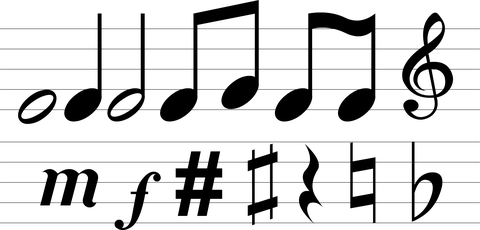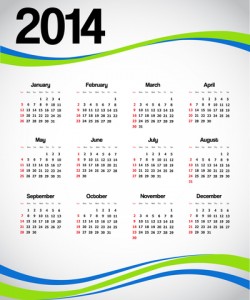 We (Edith Hope Fine and Judith Josephson) are the Grammar Patrol. Both of us taught for years and are now writers, with thirty plus books between us, including our two popular grammar guides, Nitty-Gritty Grammar and More Nitty-Gritty Grammar. For close to twenty years, we taught writing and grammar basics and now we blog about grammar for writers.
We (Edith Hope Fine and Judith Josephson) are the Grammar Patrol. Both of us taught for years and are now writers, with thirty plus books between us, including our two popular grammar guides, Nitty-Gritty Grammar and More Nitty-Gritty Grammar. For close to twenty years, we taught writing and grammar basics and now we blog about grammar for writers.
What do music and grammar have in common? More than you think. Both genres contain codes and signs for the musician or reader to follow.

In a musical work, a double line with two dots before or after it means “repeat.” A curved line over a dot signals, “hold this note longer.” A rest sign means pause and for a singer, that’s a good time to take a breath. Without observing a repeat sign, half the orchestra might repeat a passage, and the other half might simply plow forward. Cacophony! If a singer misses a rest, her entrance will be early, plus she might collapse from lack of breath.
Likewise in writing, punctuation marks guide the reader, despite recent rumors of punctuation’s demise. (Thank the shorthand of emails, texting, and tweeting!) The Grammar Patrol thinks punctuation marks add clarity. For us, in writing and reading, punctuation is a code to help readers ride smoothly through the written word.
Let’s review common marks and some of their vagaries.
One way to do this is to think of punctuation marks as traffic signals:
. Period = Stop Sign
“Come to a full stop. No sliding through.”
(One space after a period)
, Comma = Flashing Yellow Light
Slow down. Look left and right. Then continue.
• Tip: Confuse a comma with a period and presto! Run-on sentence!
• Tip: In the U.S., periods and commas always go inside quotation marks.
(Not so in England.)
; Semi-Colon=Flashing Red Light
Stop briefly; forge ahead.
(Often used when two sentences relate to each other, or for a list of items with interior commas)
: Colon = Arrow or Road Sign
“Listen up! What follows explains, adds information, or a list.”
• Tip: Colons and semi-colons always go outside quotation marks
• Tip: Exclamation marks ( ! ), question marks ( ? ) , and dashes ( — )can be inside or outside depending on the meaning of the sentence.
(More on this later. Read on.)
Pop Quiz!
(Answers below. No peeking.)
Can you spot the punctuation bloopers in these sentences?
1. The feisty jockey’s nickname is “Spitfire”.
2. Florists like romance, it’s their business.
3. The whirlwind tour includes London, England, Mont Saint Michel and Paris, France, and Frankfurt, Germany.
4. Political campaigns always include the same elements, flag waving, baby smooching, and lofty speeches.
5. Amy’s airy office, “the treehouse”, was her refuge.
Recent bloopers spotted by the Grammar Patrol:
“Food and wine lends itself to adjectives, to metaphors.”
“You may not realize that myself and my sisters . . . ”
So remember, whether you’re singing, playing an instrument, writing, or reading, look for those all-important codes, musical or grammatical. Those are the traffic signals to guide you on your adventure. For more on all things grammatical, consult our two lighthearted grammar guides, Nitty-Gritty Grammar and More Nitty-Gritty Grammar.
Attention, Grammar Bargain Hunters!
Need more specifics on punctuation or other grammar conundrums? We’re excited that Ten Speed/Random House is holding a big promotion on our Nitty-Gritty Grammar through BookBub and other retailers (At Kindle: http://amzn.to/2bTAvhU). You can get this zany grammar guide—loaded with cartoons, tips, and blooper pitfalls—for just $1.99 from August 28–September 11. What a bargain. Order ahead for birthdays, holiday gifts, work promotions, graduation, and quick reference for school, home school, and office. Tell your grammar-challenged pals!
Remember to send us bloopers you hear or see. We love hearing from you.
(Answers to Pop Quiz: 1. “Spitfire.” 2. romance; it’s 3. England; France; 4. Same elements: 5. “the treehouse,”)

 Spring House Cleaning—Easy Mix-Ups
Spring House Cleaning—Easy Mix-Ups It’s a brand new year, a good time to review how to write dates. Dates can bring about a comma conundrum.
It’s a brand new year, a good time to review how to write dates. Dates can bring about a comma conundrum.
 Writing with word processing software gives you more options than the old days of typewriters, but it also gives you gives you more ways to get into trouble. Most of us have twigged to the difference between the typewriter’s straight quotation marks and computer-generated curly ones. You’ll often hear the latter called curly quotes or smart quotes. If Honest Abe is reciting the Gettysburg address, the curly quotation that marks the beginning of his speech, should face the words—they’ll resemble the number 66: “Four score and seven years ago . . .” At the end of his speech, the marks form a 99: “shall not perish from the earth.”
Writing with word processing software gives you more options than the old days of typewriters, but it also gives you gives you more ways to get into trouble. Most of us have twigged to the difference between the typewriter’s straight quotation marks and computer-generated curly ones. You’ll often hear the latter called curly quotes or smart quotes. If Honest Abe is reciting the Gettysburg address, the curly quotation that marks the beginning of his speech, should face the words—they’ll resemble the number 66: “Four score and seven years ago . . .” At the end of his speech, the marks form a 99: “shall not perish from the earth.”